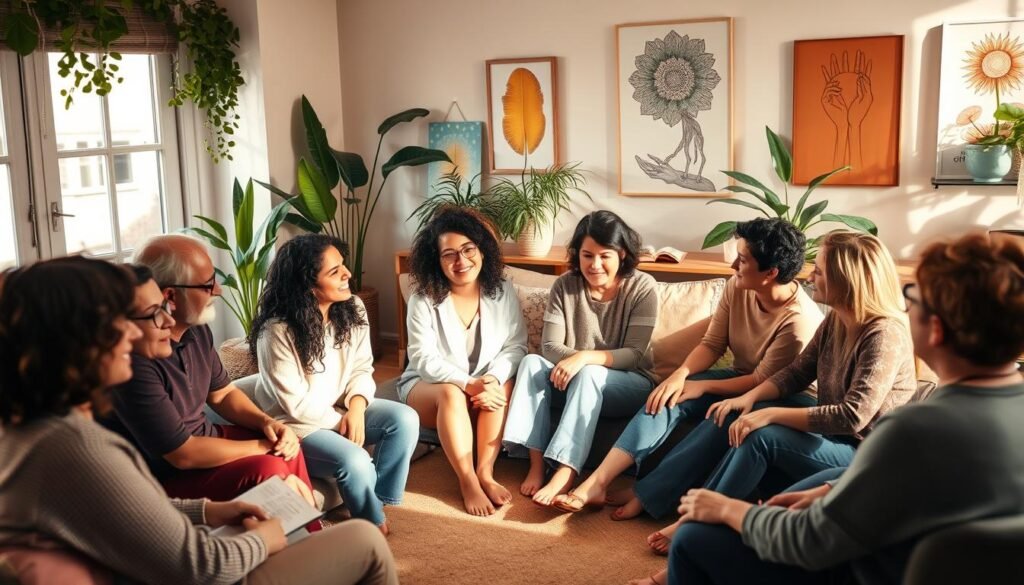About 31.6 million Americans deal with eczema. It’s more than just a skin condition; it affects how they feel inside. Feeling alone and sad is common. But joining a support group or community can really change things. They offer much-needed emotional support. Plus, they help you feel connected to others who really understand.
Getting involved in peer support networks is a big step forward. You can share what you’re going through and learn new ways to cope. This sharing helps improve life quality. Also, being part of a community helps lessen the emotional impact. It shows you’re not in this by yourself. To get more info about how feelings impact health, check out this link.
Key Takeaways
- Over 31 million people in the U.S. are affected by eczema, emphasizing the need for support.
- Support groups provide a crucial avenue for sharing experiences and coping strategies.
- Emotional support from others can significantly alleviate the burden of living with eczema.
- Peer networks foster strong connections that enhance resilience and well-being.
- Community involvement leads to a deeper understanding of management techniques and emotional struggles.
The Importance of Emotional Support in Managing Eczema
Dealing with eczema brings emotional challenges. Those affected may feel anxious or depressed. This impacts their daily life greatly. It’s important to see how crucial emotional support is. It helps them face these issues. Recognizing and understanding their emotional struggles is key. From there, they can find effective ways to cope. Support groups for eczema are great for this.
Understanding Emotional Struggles
Eczema’s constant presence leads to various emotional problems. It can lower self-worth and make people feel alone. The visibility of their condition often raises stress. This can increase anxiety and mood swings. Getting emotional support can ease these feelings. It lays the groundwork for better mental health. This helps them face emotional challenges with more strength.
How Emotional Support Affects Physical Health
Studies show emotional well-being and physical health are linked in eczema patients. Emotional support offers comfort. It also leads to real health benefits. Those with support report less frequent outbreaks. Their overall health tends to improve. Looking at the stress impact on health is important. A supportive network helps people manage their symptoms better.
| Emotional Struggles | Potential Physical Health Outcomes | Strategies for Improvement |
|---|---|---|
| Anxiety | Increased flare-ups | Relaxation techniques, therapy |
| Depression | Reduced immune response | Support groups, socializing |
| Low self-esteem | Higher stress levels | Self-care routines, positive affirmations |
How Support Groups and Communities Can Help You Cope with Eczema
Support groups provide a special place for those with eczema to connect. These groups offer a community where people can talk about their struggles and what helps them cope. Feeling part of a group can make a big difference when dealing with eczema.
The Role of Peer Support Networks
Peer support networks are vital for managing eczema. They let people share experiences and give advice that hits close to home. Being in a group where everyone understands your struggles can help you find better ways to deal with eczema. These groups don’t just offer comfort; they also help people improve their lives by linking them with others who get what they’re going through.
Building Lasting Connections
Support groups provide more than just advice; they help build deep friendships. These bonds are based on shared experiences. They encourage members to support each other, celebrate successes, and offer a shoulder during tough times. Such friendships create a support system that can help people deal better with their eczema.
| Aspect | Peer Support Networks | Traditional Support Groups |
|---|---|---|
| Connection Type | Informal, personal relationships | More structured, guided interactions |
| Focus | Shared experiences and camaraderie | Educational content and skill-building |
| Accessibility | Often online or local meetups | Scheduled meetings at specific locations |
| Impact on Coping | Enhances emotional support | Aids in problem-solving and coping strategies |
Creating Safe Spaces for Sharing Experiences
Safe spaces in support groups are key for connecting people with eczema. These areas let members talk openly, share stories, and express emotions freely. There’s no fear of being judged.
Such communication boosts understanding and empathy among members. It helps everyone heal together.
Encouraging Open Dialogue
Open dialogue in these groups lets members share their experiences. It creates a place where honesty and being vulnerable are encouraged. This helps individuals face their challenges and connect with others.
By sharing, members learn from each other. This builds a supportive community feeling.
Reducing Feelings of Isolation
Support groups bring many benefits, like making people feel less isolated. In a welcoming space, members realize they’re not alone. This encourages more social interactions and a feeling of belonging.
These actions lighten the mental load on members. They also build stronger personal and community connections.
Types of Support Groups Available
There are many support groups for people with eczema. They offer help and a sense of community. You can find anything from online forums to group therapy sessions. Each one has its own way of making life better for those dealing with eczema.
Online Communities for Eczema Support
Online communities are a key resource for eczema support. They connect people from all walks of life. In these groups, members share stories, tips, and encouragement. This helps everyone feel less alone and more understood.
Self-Help Groups and Their Benefits
Self-help groups help members feel powerful and in control. People talk and learn together about how to cope with eczema. These groups create strong connections and shared wisdom. This makes facing eczema easier and less scary.
Group Therapy Options for Enhanced Coping
Group therapy is led by experts but focuses on group support. It’s a place to deal with hard emotions in a safe way. You learn better ways to handle your eczema and feel part of a larger community too.

| Type of Support Group | Description | Benefits |
|---|---|---|
| Online Communities | Digital platforms for sharing experiences | Accessible support, diverse interactions |
| Self-Help Groups | Peer-led meetings focused on empowerment | Shared responsibility, personal growth |
| Group Therapy | Professional-led sessions for structured support | Enhanced coping, professional guidance |
How Community Building Fosters Resilience
Community building is key in helping people with eczema become more resilient. When people unite, they form a support network. This network improves their ability to cope and their overall mental health. This part talks about the need to strengthen social ties and feel like you belong.
Strengthening Social Connections
Having strong relationships and a good social network is crucial for those dealing with eczema. Within these social groups, people can share experiences and tips on handling their condition. Some benefits of building a community include:
- Improved encouragement through shared experiences
- Access to diverse coping strategies and solutions
- Enhanced emotional resilience in facing daily challenges
Creating a Sense of Belonging
Feeling like you belong can drastically help with emotional recovery. When people feel important in their community, they become more resilient. Factors that help create this sense include:
- Open lines of communication nurturing trust and understanding
- Shared goals and aspirations fostering unity
- Celebration of achievements, both big and small, reinforcing positivity
Focus on community support is vital for effectively managing eczema. It helps individuals feel safe and understood. Thanks to these connections, their emotional and mental health strengthens. This allows them to approach their condition with more confidence and strength.
Accessing Resources and Information through Communities
Support groups are key for those looking to learn more about eczema and its treatments. These groups share research and help people stay up-to-date on eczema care. By talking with others who understand, individuals can find resources to make better health choices.
Sharing the Latest Research and Treatments
People make smarter decisions about their treatment with the right information. At support group meetings, members talk about the newest eczema research. This community support helps everyone learn about new treatments. Knowing they have support, members feel ready to try new things.
Offering Helpful Tips and Coping Strategies
Support groups offer more than just research news. They also share practical advice for dealing with eczema’s daily issues. These tips and strategies help improve how individuals manage their condition. It also builds a strong, supportive community.

Joining such groups gives people access to important information and a place to learn and grow. To learn more about support groups, click here.
| Research Topic | Treatment Option | Helpful Tip |
|---|---|---|
| Latest Eczema Treatments | Topical Steroids | Apply moisturizer immediately after bathing to lock in moisture. |
| Clinical Trials for Eczema | Biologics | Join an online support group for ongoing updates and community experiences. |
| Nutrition and Eczema | Allergy Testing | Maintain a food diary to identify possible triggers. |
Developing Coping Mechanisms through Support
Support groups are crucial for people facing problems like eczema. They help develop coping skills by sharing experiences and strategies. This sharing teaches valuable techniques for mental health that build resilience and foster positive thinking.
Mental Health Support Techniques
There are many ways to boost emotional well-being. Some key techniques include:
- Mindfulness practices to focus on the present.
- Cognitive restructuring to fight off negative thoughts.
- Relaxation methods such as guided imagery or muscle relaxation.
Applying these techniques with support from others can lessen anxiety. It also helps improve overall mental health.
Effective Stress Reduction Methods
Reducing stress is crucial for people with eczema to improve their lives. Some effective strategies used by individuals and groups are:
- Meditation to achieve calmness.
- Yoga for physical activity and mental focus.
- Breathing exercises to calm both body and mind.
Community support helps people embrace these healthy habits. It makes stress management a group effort and creates a supportive environment.
The Role of Shared Experiences in Healing
Support groups are vital for healing eczema. They allow individuals to find strength by hearing others’ stories. This sense of community leads to personal growth and better well-being.
Learning from Others’ Journeys
Sharing stories in the group shows different ways to manage eczema. These stories offer practical tips and a sense of belonging. This helps people find new ways to cope and builds resilience.
Encouraging Hope and Motivation
In support groups, uplifting stories bring hope and motivation. They show that managing eczema is possible. Seeing others overcome their challenges encourages people to keep striving for better health.

| Aspect | Description | Impact on Healing |
|---|---|---|
| Shared Experiences | Sharing personal stories and challenges within the group. | Increases understanding and reduces feelings of isolation. |
| Learning from Others | Gaining insights and coping strategies from peers. | Encourages the adoption of new practices that enhance well-being. |
| Hope and Motivation | Hearing success stories of peers who have managed their eczema. | Boosts morale and reinforces a positive outlook on treatment options. |
Encouragement and Accountability in Support Groups
Support groups play a key role in managing eczema. They provide a place where people find motivation and support. Folks share their experiences and coping methods. This leads to healthier habits and sticking to care routines better.
Keeping Each Other Motivated
Members of these groups regularly lift each other up. They meet often to remind each other of their health goals. This makes everyone more motivated and ready to face challenges. Celebrating even the little victories keeps the spirit high.
It ensures everyone feels part of the journey towards better health.
Setting and Achieving Personal Goals
In these groups, setting goals is a big deal. Everyone works together to set realistic goals. This makes it easier for people to reach their health targets.
Getting support from the group makes achievements feel even more special. This boosts commitment and celebrates successes together. It strengthens the support system and makes everyone’s wins a reason to celebrate.
Conclusion
Support groups and being part of a community are very important for dealing with eczema. They give emotional support that helps people handle their condition better. When people share their stories, it builds strength and a feeling of fitting in.
These groups also share the newest info on eczema treatments and tips. This empowers everyone with knowledge. Studies show, such as the one on nurse-led support for chronic conditions, how crucial this support is for mental health. It’s the same with eczema.
Having support networks makes managing eczema easier. By focusing on emotional support and friendship, people can enjoy the amazing benefits of support groups. This not only helps deal with eczema. It also creates hope and resilience in the community.